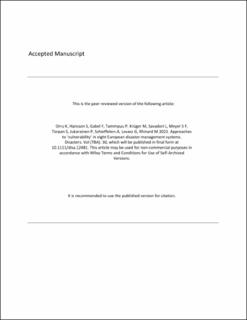| dc.contributor.author | Orru, Kati | |
| dc.contributor.author | Nero, Kristi | |
| dc.contributor.author | Nævestad, Tor-Olav | |
| dc.contributor.author | Schieffelers, Abriel | |
| dc.contributor.author | Olson, Alexandra | |
| dc.contributor.author | Airola, Merja | |
| dc.contributor.author | Kazemekaityte, Austeja | |
| dc.contributor.author | Lovasz, Gabriella | |
| dc.contributor.author | Scurci, Giuseppe | |
| dc.contributor.author | Ludvigsen, Johanna | |
| dc.contributor.author | de los Rios Pérez, Daniel A. | |
| dc.date.accessioned | 2022-10-26T12:29:10Z | |
| dc.date.available | 2022-10-26T12:29:10Z | |
| dc.date.created | 2021-12-08T10:24:16Z | |
| dc.date.issued | 2021-12-07 | |
| dc.identifier.citation | Disasters. The Journal of Disaster Studies, Policy and Management. 2021, 45 (S1), S48-S75. | en_US |
| dc.identifier.issn | 0361-3666 | |
| dc.identifier.uri | https://hdl.handle.net/11250/3028448 | |
| dc.description.abstract | The Covid-19 pandemic has challenged the resilience of care organisations (and those dependent on them), especially when services are stopped or restricted. This study focuses on the experiences of care organisations that offer services to individuals in highly precarious situations in 10 European countries. It is based on 32 qualitative interviews and three workshops with managers and staff. The four key types of organisations reviewed largely had the same adaptation patterns in all countries. The most drastic changes were experienced by day centres, which had to suspend or digitise services, whereas night shelters and soup kitchens had to reorganise broadly their work; residential facilities were minimally affected. Given the drastic surge in demand for services, reliance on an overburdened (volunteer) workforce, and a lack of crisis plans, the care organisations with long-term trust networks with clients and intra-organisational cooperation adapted easier. The outcomes were worse for new clients, migrants, psychologically vulnerable people, and those with limited communicative abilities. | en_US |
| dc.language.iso | eng | en_US |
| dc.publisher | Wiley | en_US |
| dc.rights | Attribution-NonCommercial-NoDerivatives 4.0 Internasjonal | * |
| dc.rights | Attribution-NonCommercial-NoDerivatives 4.0 Internasjonal | * |
| dc.rights.uri | http://creativecommons.org/licenses/by-nc-nd/4.0/deed.no | * |
| dc.title | Resilience in care organisations: challenges in maintaining support for vulnerable people in Europe during the Covid-19 pandemic | en_US |
| dc.type | Journal article | en_US |
| dc.type | Peer reviewed | en_US |
| dc.rights.holder | © 2021 The Authors Disasters © 2021 Overseas Development Institute. | en_US |
| dc.description.version | acceptedVersion | en_US |
| cristin.ispublished | true | |
| cristin.fulltext | postprint | |
| cristin.qualitycode | 1 | |
| dc.identifier.doi | 10.1111/disa.12526 | |
| dc.identifier.cristin | 1966007 | |
| dc.source.journal | Disasters. The Journal of Disaster Studies, Policy and Management | en_US |
| dc.source.volume | 45 | en_US |
| dc.source.issue | S1 | en_US |
| dc.source.pagenumber | S48-S75 | en_US |

